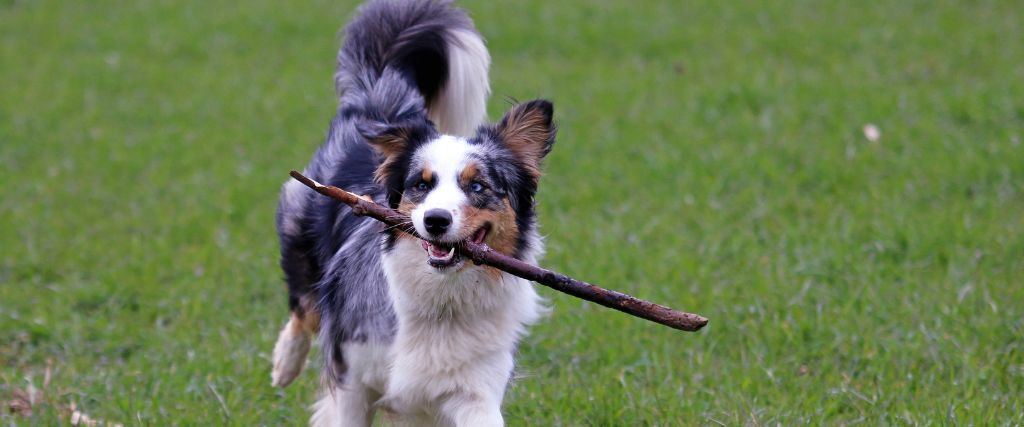
If you've got an Australian Shepherd at home, you already know she's basically a four-legged genius. Seriously, these dogs are whip-smart! This doesn't just mean they'll ace the doggy IQ test; it means they're playful, energetic, and always up for a game of fetch or a problem-solving toy.
Why We Love Our Aussies
But it's not just smarts that make Aussies amazing; they're also incredibly versatile. Whether you're looking for a jogging companion, a family guardian, or even a hardworking farm dog, your Aussie is up for the task. And when it comes to training? These dogs thrive on positive reinforcement, which means you'll have the perfect pup faster than you can say "Sit, stay, good dog!"
One of the beauties of having an Aussie is that they're pretty adaptable to a range of living conditions. So, whether you're apartment living or have acres of land, your Aussie will make herself at home.
The Quirky Side of Aussies
However, let's be real—nobody's perfect, not even our Aussie friends! Your loving companion will raise a vocal alarm at suspicious newcomers, be it human or another furry friend. Also, you might notice her herding instincts kicking in—even when it comes to herding your kids in the yard!
If you're not a fan of regular grooming sessions, you may need to adjust your mindset. An Aussie's luxurious coat needs some TLC to keep it healthy and tangle-free. And yes, your Aussie might be a bit wary of strangers—but don't worry, once someone's in the "inner circle," it's love all the way.
Why Aussies are More Than Worth It
Still, asking if the Aussie lifestyle is worth it? Just watch your dog cleverly solve a puzzle toy or master an agility course, and you'll have your answer. She's an intelligent and diligent worker who loves a good challenge.

A Little History Lesson
Interestingly, despite their name, Australian Shepherds were actually developed right here in the USA—California, to be precise, back in the 1900s. Aussies quickly became renowned for their herding skills, especially when it comes to managing large herds of animals. But their talents don't stop there. These remarkable canines excel as guide dogs, in obedience sports, and even as your everyday family pet. They're great with children, loyal to the core, and boast stable temperaments.
Key Aussie Stats
Before you dive headfirst into Aussie ownership, remember these fur-babies are best suited for active families, ideally with a spacious fenced yard to run around in. When it comes to exercise and mental stimulation, let's just say—"the more, the merrier!" A bored Aussie is a recipe for trouble.
In terms of size, Aussies vary quite a bit, weighing in anywhere from 35 to 70 pounds. And when well taken care of, these amazing dogs can be your loyal companion for an average of 12 to 13 fabulous years.
So, is an Aussie the right fit for your family? If you're active, committed, and ready for a fun, intelligent companion, the answer is a resounding "Yes!"
Genetic Predispositions for Australian Shepherds
The MDR1 Gene and Multidrug Resistance
First up is a little science lesson on something called the MDR1 gene, which plays a significant role in multidrug resistance. If your Aussie inherits a mutated version of this gene, it means that certain medications—like those used to treat parasites, diarrhea, or even cancer—might not be processed well by their body. The good news? Nowadays, a simple DNA test can help identify if your dog is at risk for drug-related side effects. So, consider getting your pup tested early on to pave the way for a lifetime of safe treatments!
Bones and Joints: Know the Risks, Make a Plan
Musculoskeletal issues can be quite common in Australian Shepherds, but don't fret—most of these conditions are treatable, especially if you catch them early. Keep an eye out for signs like limping, difficulty getting up, or stiffness in the hips or elbows. These could be indicators of dysplasia, an inherited disease that affects the joints and can lead to arthritis. Quick diagnosis and treatment, possibly even surgery in severe cases, can do wonders. Oh, and a heads up: Keeping your Aussie at a healthy weight can ward off arthritis from striking too early!
Here's another term for you—Legg-Calve-Perthes disease. This usually shows up in young Aussies, causing pain and limping in one or both back legs. The cause isn't completely understood, but it's related to reduced blood supply to the hip area. The treatment often involves surgery, so early detection is key.
Lymphoma: What You Need to Know
Lymphoma—a type of cancer that sadly is more common in Australian Shepherds than in other breeds. Lymphoma affects white blood cells and can appear almost anywhere in the body. The silver lining here is that it's one of the most treatable canine cancers, especially with chemotherapy. Regular blood tests can often detect this early, so we recommend complete blood counts twice a year. At home, keep an eye out for symptoms like swollen glands, unexpected weight loss, or labored breathing.
Hemangiosarcoma: The Silent Bleeding Tumor
Hemangiosarcoma is a sneaky bleeding tumor that affects Aussies more frequently than other breeds. These tumors often originate in the spleen but can crop up in other organs too. What's scary is that these tumors can grow to be quite large before showing any signs. They can suddenly rupture, leading to internal bleeding. Our best advice? Regular senior wellness tests, including blood tests and ultrasounds, can be a lifesaver—literally.
Epilepsy: Understanding Seizures in Your Aussie
When it comes to seizures, there are three main types: reactive, secondary, and primary or idiopathic epilepsy. Aussies are more prone to primary epilepsy, an inherited condition. Seizures typically start to appear when your dog is between six months and three years old. If your dog experiences a seizure, it's crucial to keep them safe from injury but avoid trying to control their mouth or tongue. Medication is usually a long-term requirement, and periodic blood tests will help adjust dosages and check for side effects.
Keep an Eye on Those Eyes!
Eyes are the window to the soul, but they can also be a window into your Aussie's health. Various eye conditions can affect Australian Shepherds, ranging from mildly annoying to potentially blinding.

- Cataracts: Particularly common in older Aussies, cataracts cloud up the eye lens, affecting vision. While many dogs adapt well to vision loss, surgery can sometimes restore sight.
- Distichiasis: This painful condition arises when extra hairs grow inside the eyelid and irritate the eye. Thankfully, it's treatable, usually by removing the offending hairs.
- Pannus: Imagine a tan, but on your dog's eyeball. It's an inflammation that darkens the cornea and can lead to blindness. Keep an eye out for it during check-ups!
- Progressive Retinal Atrophy (PRA): This inherited condition is particularly cruel, as it's programmed to make your Aussie go blind over time. The good news? There's a genetic test that can identify if your dog is at risk.
Hemolytic Anemia & Thrombocytopenia: When the Immune System Misfires
In some rare cases, your Aussie's immune system might mistakenly target its own red blood cells or platelets. This can lead to anemia, where your dog becomes weak and lethargic, or thrombocytopenia, which affects blood clotting. If your pup's gums look pale or yellowish, it's time to visit the vet for blood tests. Treatment often includes immune-suppressive drugs and, sometimes, emergency transfusions.
Bleeding Disorders: A Hidden Risk
Certain inherited bleeding disorders can be particularly dangerous when your Aussie needs surgery or suffers a serious injury. Von Willebrand's disease is one such clotting disorder that is more common in Australian Shepherds. Always ensure pre-surgical blood tests to screen for these conditions.
Stones in the Bladder or Kidney: Stay Away Stones!
Aussies are a bit more prone to developing painful bladder stones or kidney stones. If your pup shows signs like bloody urine or struggles to urinate, seek emergency medical help. Periodic urine tests can be a great preventive measure.
Retained Testicle: Catch It Early!
Some male Aussies are born with one or both testicles undescended, a condition known as cryptorchidism. This can increase the risk of cancer later in life. Usually, vets check for this when your pet is still a puppy, and the treatment is surgical removal of both testicles.

Liver Issues: Keep an Eye on the Blood Flow
Your Aussie has a higher chance of developing a liver disorder known as portosystemic shunt (PSS). In PSS, the blood that should nourish the liver bypasses it, leading to problems like stunted growth and seizures. Liver function tests can help diagnose this issue, which might require surgery or dietary changes.
Cushing’s Disease: Slow but Steady
Your Aussie has a higher likelihood of developing Cushing's Disease, a condition where the adrenal glands produce excess steroids. The symptoms creep up slowly and may include increased thirst, appetite, and lethargy. Medication, usually oral, is the common course of treatment.
Diabetes: Not Just a Human Problem
Australian Shepherds have an above-average chance of developing diabetes, a condition that impacts sugar metabolism. Symptoms include increased eating, drinking, and urination. Diagnosis is through lab tests, and daily insulin injections are usually required for management.
Thyroid Problems: Hormones Out of Whack
Aussies can be susceptible to hypothyroidism, where the thyroid doesn’t produce enough hormones. This can lead to a host of symptoms, from dry skin to behavioral changes. Annual blood tests can catch this early, and treatment is generally simple—hormone replacement via pills.
If you have questions and you'd like to reach out to us, you can call us directly at (856) 409-7179, or you can email us at [email protected]. Don't forget to follow us on social media Facebook, Instagram
